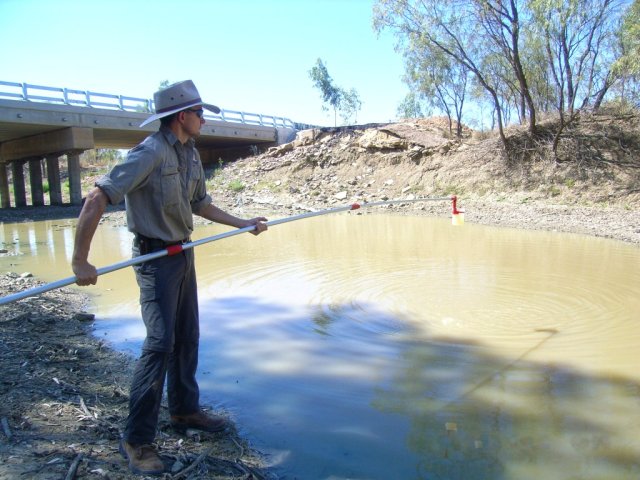
The controversial Adani Carmichael coalmine was granted an unlimited 60-year water licence by the Queensland government on March 29. Environmentalists fear the mine will drain huge amounts of water from the Great Artesian Basin and say it is yet another example of governments giving the mine special treatment.
According to the licence, the mine will only have to monitor and report the amount of water it extracts. It can conduct its own review of its groundwater model without independent or government oversight. No impact levels are specified that will trigger a halt to mining, and the company is able to offset any significant water loss elsewhere.
The mine will be able to take water from or near the Betts Creek formation when removing or draining water from the mine. The licence acknowledges this will “have an impact on the underground water levels in the region of the mine” during and after the mine’s years of operation.
The Environmental Defenders Office (EDO) said the licence would grant Adani access to up to 9.5 billion litres of groundwater every year, which will potentially impact the ancient springs, local ecosystems and the sustainability of Queensland’s groundwater resources.
EDO chief executive Jo-Anne Bragg said: “Certainly the implications are that if the groundwater is taken, then it’s not available for other more long-term or sustainable uses. This would be an irreversible serious consequence of these enormous coalmines.”
A spokesperson for the Department of Natural Resources and Mines said: "Adani will also need to establish make-good agreements with groundwater users who could potentially be affected by changes to water availability or quality." But opponents of the mine said that would potentially be too late to reverse any damage caused to the region’s farms and land.
“Our experience is that this is no substitute for sustainable water resources for landowners,” Bragg said. “There’s an issue about whether this controversial company will even be in existence to honour make-good agreements over that time and practical issues such as where the water would be supplied from.”
The EDO explained that dewatering of groundwater from a mining pit would historically have required a water licence under the Water Act 2000, which provides the community with submission, review and appeal rights. However, the previous Queensland government introduced legislation to remove the need for mines to obtain a water licence.
Environmental groups lobbied the current Queensland government to introduce an amendment Bill to repeal this change and require all mines, even those that are mid-assessment like the Adani mine, to obtain a licence for groundwater.
This would ensure the proper assessment of the impacts on the environment and community of proposed groundwater removal, and the community would have the right to provide submissions, review and appeal the decisions for these licences.
The amendment bill was passed last November, but a last-minute change meant unlike other controversial mines, such as the New Acland coalmine planned for the Darling Downs, Adani's water usage is not subject to public submissions and appeals.
It was "absolutely anomalous" that the Carmichael mine — which will dwarf New Acland's output of about 7.5 million tonnes a year — should go through a less vigorous process for its water licence, Bragg said.
Carmel Flint, a campaigner for Lock the Gate, said the open-ended water licence for Adani amounted to a "free kick" to take water from important aquifers such as the Dunda Beds and Clematis Sandstone formations.
Ariane Wilkinson, from Environmental Justice Australia, said there were also other areas of concern, including the lack of any need under Queensland’s Environmental Protection Act for the government to consider the history of Adani and its related companies’ alleged foreign environment law offences.
“It goes completely under the radar,” Wilkinson said. “In Australia, Adani has not demonstrated it can comply with environmental laws and regulations while embarking on a project of the size and scale of Carmichael.
“In India, Adani has taken on projects of this scale and risk and we know that it has been found guilty of serious environmental breaches.”
Like the article? Subscribe to Green Left now! You can also like us on Facebook and follow us on Twitter.